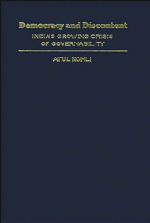Book contents
- Frontmatter
- Contents
- List of tables and figures
- Preface and acknowledgments
- PART I INTRODUCTION
- PART II THE GROWING PROBLEMS OF GOVERNING THE PERIPHERY: POLITICS IN THE DISTRICTS
- Introduction: the districts
- 3 Kheda, Gujarat
- 4 Guntur, Andhra Pradesh
- 5 Belgaun, Karnataka
- 6 Calcutta, West Bengal
- 7 Madurai, Tamil Nadu
- Conclusion: the districts
- PART III ORDER AND BREAKDOWN IN THE STATES
- PART IV CENTRALIZATION AND POWERLESSNESS AT THE CENTER
- PART V FINAL INFERENCES
- Bibliography
- Index
6 - Calcutta, West Bengal
Published online by Cambridge University Press: 05 June 2012
- Frontmatter
- Contents
- List of tables and figures
- Preface and acknowledgments
- PART I INTRODUCTION
- PART II THE GROWING PROBLEMS OF GOVERNING THE PERIPHERY: POLITICS IN THE DISTRICTS
- Introduction: the districts
- 3 Kheda, Gujarat
- 4 Guntur, Andhra Pradesh
- 5 Belgaun, Karnataka
- 6 Calcutta, West Bengal
- 7 Madurai, Tamil Nadu
- Conclusion: the districts
- PART III ORDER AND BREAKDOWN IN THE STATES
- PART IV CENTRALIZATION AND POWERLESSNESS AT THE CENTER
- PART V FINAL INFERENCES
- Bibliography
- Index
Summary
Calcutta, the capital of British India until 1912, and then the “neglected city” of both British and independent India, is now the seat of government for communist-ruled West Bengal. The poverty and degradation in everyday life in Calcutta are legendary. Instead of dwelling on all that is grotesque, miserable, and dramatic, however, I begin this discussion with some demographic facts that are essential to the political analysis. The area now under the Calcutta Municipal Corporation, the city government, has about 4 million inhabitants. With some 32,000 living in every square kilometer (nearly 85,000 per square mile), Calcutta has three times the population density of New York City. The extent of poverty in this congested city is evident in the fact that as many as 40 percent of the households do not have a single family member with a regular job. Most of the jobless poor live in some two hundred bustees, urban slums made up of collections of huts that often lack running water, sewerage, and electricity. A significant minority are homeless and sleep on the streets. Although the exact numbers of bustee dwellers and homeless are not known, city officials estimate that about 30 percent of the city's population, some 1.5 million persons, live in bustees, and 500,000 to 600,000 live in the streets.
There are four other demographic facts that have political significance. First, the growth in the city's population has slowed down. Calcutta simply does not attract migrants the way it once did.
- Type
- Chapter
- Information
- Democracy and DiscontentIndia's Growing Crisis of Governability, pp. 123 - 153Publisher: Cambridge University PressPrint publication year: 1991



